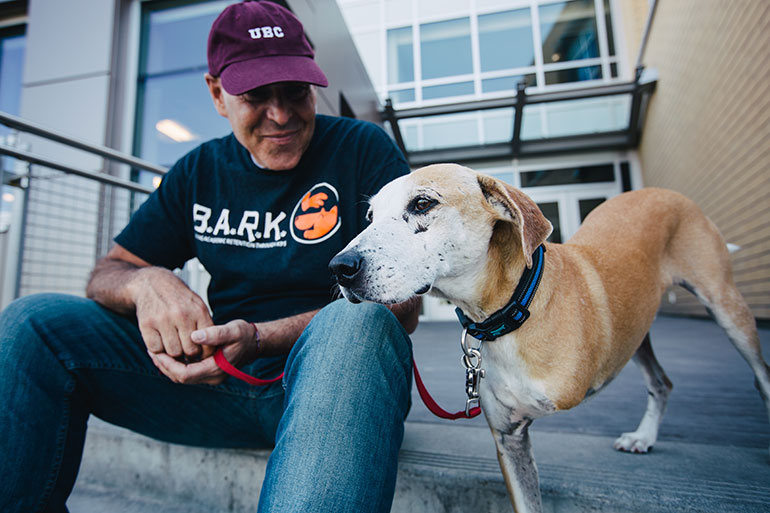
UBCO Associate Professor John-Tyler Binfet, whose research focusses on measuring kindness in schools, children and adolescents, practices what he preaches. Binfet poses with his new rescue dog Craig.
UBCO researcher seeks to understand the good things that people do
World Kindness Day takes place on November 13. For some, it’s a time to focus on and promote the power of positivity. For others, it’s a day to celebrate the thoughtful acts performed by friends, family, neighbours and strangers.
For UBC Okanagan researcher John-Tyler Binfet, a professor in the School of Education, recognizing and celebrating kindness happens throughout the year. For the last eight years, he has dedicated himself to researching how children and adolescents think about and enact kindness.
With World Kindness Day approaching, Binfet shares his research experiences and highlights the importance of nurturing pro-social behaviours in children and adolescents.
Binfet is currently working on a book for University of Toronto Press that will focus on the ways parents and educators can support traits like compassion and sympathy in children and adolescents. The book will be released in late 2020.
Why research kindness in schools?
Parents and educators typically have high expectations that children and adolescents are kind, but there is little research that shows how they are. The work I do sheds light on how children and adolescents define, demonstrate and receive kindness, especially within the context of schools.
I hope my work counterbalances the bullying literature and that it elevates the discussion of kindness.
What challenges did you face when you started your research?
Initially, there was no way to measure kindness in schools. So, the first foray into my research was to develop a scale. I worked with two UBC colleagues, Anne M. Gadermann, a specialist in the social determinants of health, and Kimberly A. Schonert-Reichl, an applied developmental psychologist. Together we developed the School Kindness Scale which asked students to what extent their school and the people in it are kind based on a five-point scale.
After more than 3,000 interviews with Okanagan-based kindergarten to grade nine students, what have you learned?
Not all kindness is the same. According to children and adolescents there are different types, which include:
- Intentional, where you make a plan. For example, when you know a friend is sad and you decide to do something to cheer them up.
- Random, where the act is spontaneously performed or reactionary, like picking up a dropped book for someone.
- Quiet, where the thoughtful act doesn’t draw attention to the initiator. Like leaving change in the vending machine for the next student.
Being kind doesn’t necessarily come easily to all students, however, and there are some who need extra support to understand the concept. When asked, some students struggled with defining kindness and generating examples of what they could do to show it.
What was a highlight for you during your interviews?
I think one of my key takeaways was what I learned about how students see kindness in their teachers. When asked to describe a teacher being kind, overwhelmingly they will describe a teacher teaching—providing support to children to advance their learning. It wasn’t the big fieldtrips or guest speakers in the class that they identified, it was teachers showing they care about students through instruction.
How can we help children and adolescents cultivate kindness?
Ask yourself: ‘How am I kind? How do I show that I’m thoughtful, courteous or compassionate?’ Parents, educators and community members can all help children and adolescents develop strong social and emotional skills by modelling pro-social behaviour—basically, the type of behaviour they wish to see exhibited by others.